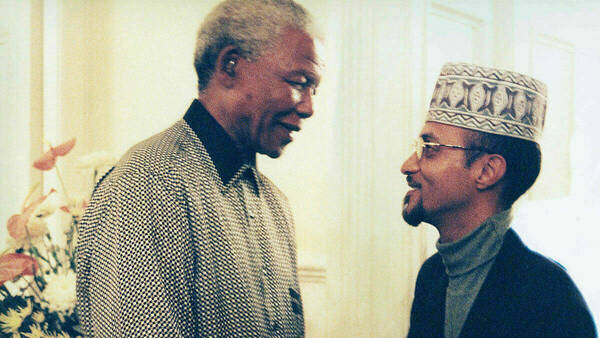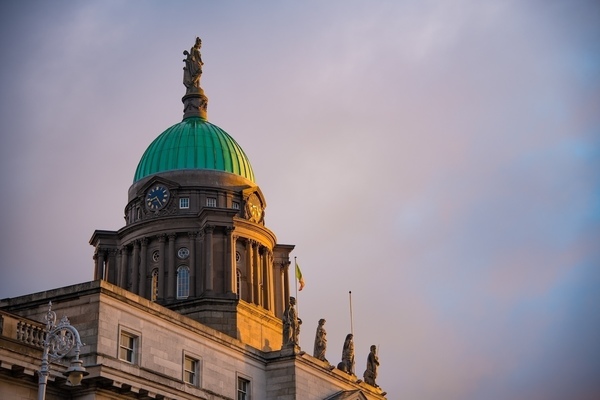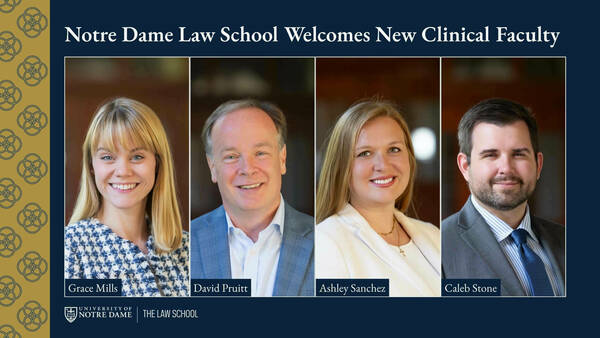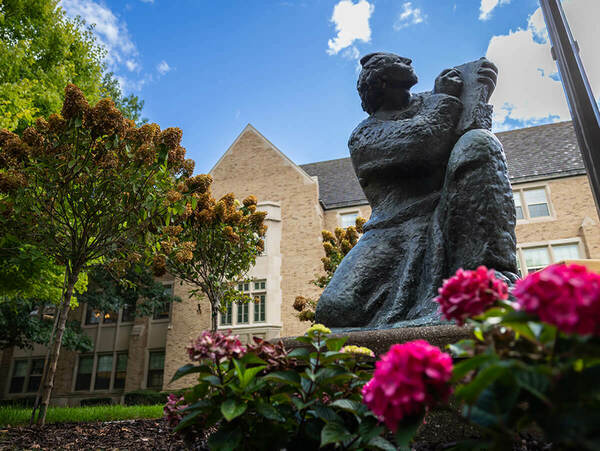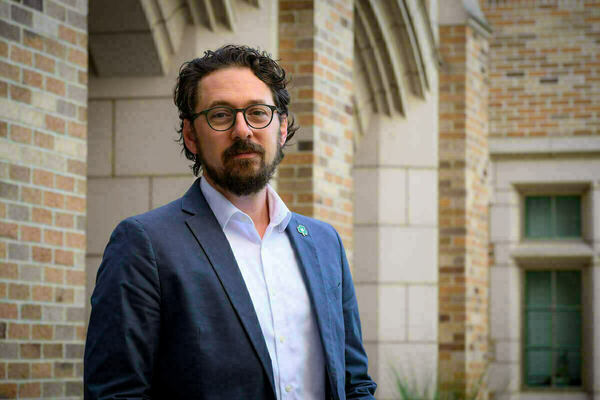Religion and peace: A conversation with imam and scholar A. Rashied Omar

As a young man in 1970s South Africa, A. Rashied Omar saw firsthand how Apartheid assaulted human dignity. He took a stand against its systemic racism, first as a high school student and later as an imam. Omar drew on his faith to work for change, collaborating with activists from multiple religious traditions.
In this conversation, Omar, associate teaching professor of Islamic studies and peacebuilding in the Keough School of Global Affairs, shares how this experience profoundly shaped him.
He also talks about how he discovered a new career as a scholar after encountering a supportive intellectual community at Notre Dame. And he explores how his pastoral work as an imam continues to ground his scholarship in grassroots perspectives.
Your passion for social justice draws from your faith tradition. Talk a bit about that.

In 1976, I was in the final year of my high school career in South Africa during Apartheid when I got caught up in national student protests. I was a student leader, protesting against the way the Apartheid system demeaned people of color and assaulted their human dignity. I was imprisoned for a short period, put on trial and suspended from school. That was really what I would call my baptism into social justice activism.
The Apartheid system was built on physical violence as well as structural violence that was unsustainable. So that led me onto this journey of sustainable peacebuilding. Ultimately I think peace and justice are two sides of the same coin: you cannot have real sustainable peace without justice. And during the period of my incarceration and court trials, I found great sustenance in my faith commitment as a Muslim.
During this period, I was spending a lot of time at the Claremont Main Road Mosque in Cape Town. It had a strong history of anti-Apartheid work and witnessing for justice. One of the Claremont imams, Abdullah Haron, was imprisoned for his anti-apartheid activism and had been tortured to death in 1969. After I got involved I eventually became the understudy to Imam Gassan Solomon. In 1985, he was hounded by the police for his anti-Apartheid leadership and went into exile. I had to step up as his protege to become the next imam. So I stood on the shoulders of great individuals. And that’s the kind of spiritual well that I drank from.
You also met Archbishop Desmond Tutu, who was a prominent anti-Apartheid activist. How did that influence you?

I was appointed as an imam at the Claremont Main Road Mosque in 1986, the same year that Rev. Tutu was named the first Black Anglican Archbishop of Cape Town. As archbishop, he lived in a designated residence within a mile of my mosque. In the late 1980s, I had the privilege of joining him for consultative meetings where we would strategize about our anti-Apartheid protest marches and racial justice campaigns. Through these activities, I came to know Archbishop Tutu and drew inspiration from his prophetic witness for social justice.
I remember on one occasion he had been invited for dinner at one of my congregant’s homes, and we shared a sumptuous meal together with Mama Leah Tutu and the rest of the Tutu family. That evening, he fondly referred to me as his “Muslim son.” He remains a huge influence on how I think about my work.
How did you find Notre Dame and begin to study peacebuilding?
In 1994, South Africa transitioned from Apartheid to a nonracial democracy under President Mandela. As an imam, I quickly discovered there were new challenges for peacebuilding. It turns out that we had negative peace, the absence of violence and conflict, and we now needed to work toward positive peace, a kind of social justice that involved restitution, forgiveness and reconciliation. During Apartheid, we had a theology of resistance; now, we needed a theology of reconstruction. And I found myself lacking in the intellectual and theological skills needed to fulfill this responsibility.
It was then that I met Rev. Oliver Williams, C.S.C, a Catholic priest from Notre Dame who was working in Cape Town, and he invited me to deliver a lecture at Notre Dame. As soon as I got back home, I applied to study for a master’s degree in international peace studies at the University, and ultimately I was accepted. I knew nothing about Notre Dame, but I knew I needed the skills the program would teach me, so I came here.
The experience provided me with an opportunity to reenergize myself and to strengthen my intellectual abilities. It also enabled me to become part of a vibrant intellectual community. I met people like John Paul Lederach, a pioneering peace scholar and practitioner who served as a mentor to me, and Scott Appleby, a top historian of religion who led the Kroc Institute for International Peace Studies and went on to serve as founding dean of the Keough School. Notre Dame is now my home.
Notre Dame embraces religion. How has that enriched your experience?

I have flourished in this environment. I have been continually inspired by the interfaith focus of the late Rev. Theodore M. Hesburgh, C.S.C.
Father Ted always welcomed me. He used to say, “Rashied, I'm so happy you are here. I want Notre Dame to be a place where Muslim scholars and scholars from all faiths will come and do all their thinking and learn from each other and go on to be religious peacebuilders.”
I think his vision is beginning to bear fruit. You can see it in the Keough School and its Ansari Institute for Global Engagement with Religion and Kroc Institute for International Peace Studies. I am honored to be a part of this work.
Religious traditions emphasize human dignity — a foundational concept for the Keough School. How do you see that?
Integral human development, the idea of holistically promoting the dignity of each person and the whole person, is a wonderful concept. It resonates deeply with me as a scholar of Islam. In Arabic, we call it “karamat al-insan,” or human dignity that is God-given.
And if you can affirm the human dignity of all people, irrespective of their nationality, irrespective of their religion or whatever divides us as human beings, that’s a powerful concept for peacebuilding. It’s also one that integrates into every aspect of our lives, from economic development to our intellectual and spiritual experience.
Affirming human dignity in this holistic way is a meaningful concept that flows from multiple religious traditions and can guide us as we work to make a difference in the world.
You have continued to practice both as a cleric and a scholar. How has that shaped your thinking?

I’ve been fortunate to teach both graduate and undergraduate students over the years and to continue working part-time as an imam at my mosque. Generally, I spend the fall in Cape Town and the spring here on campus in South Bend. And this has been a wonderful opportunity for me to remain engaged at the grassroots level.
This is particularly valuable to me as a scholar of peace studies. As scholars in this discipline, my colleagues and I are values-oriented: We want to address injustice in all of its forms and we want to promote justice. So, coming from South Africa, and being an imam and a peacebuilder, has given me the opportunity of being in touch with issues on the ground.
For me this means peacebuilding from the ground up, drawing on local contexts and perspectives rather than theorizing in the abstract. That approach continues to inform my work.
Omar is a core faculty member at the Keough School's Kroc Institute for International Peace Studies and a faculty fellow of the school’s Ansari Institute for Global Engagement with Religion.
Originally published by at keough.nd.edu on August 11, 2025.
Latest Research
- ND research teams awarded funding to address sustainability challenges around the worldNotre Dame's Just Transformations to Sustainability Initiative has awarded funding to three cross-disciplinary faculty teams leading research on pressing sustainability issues—including forest conservation in the Amazon, watershed…
- Fighting to improve hurricane forecastsResearchers at Notre Dame are improving hurricane forecast accuracy, giving officials time to evacuate and protect residents. Read the article
- 2025 Naughton Fellowships awarded to four joint faculty projectsThe University of Notre Dame’s Naughton Fellowship program has announced its faculty awardees for the 2025-2026 cohort. Faculty from leading Irish universities and Notre Dame have come together to work on four research projects as a part of the Naughton Faculty…
- Notre Dame Law School Welcomes Four New Clinical Faculty Members for 2025–26Notre Dame Law School is pleased to welcome four new clinical faculty members for the 2025–26 academic year. “It is an honor to welcome such a distinguished group of clinical professors to Notre Dame Law School. Their impressive achievements and deep sense of vocation will enrich our academic…
- Six early-career scholars join the inaugural Provost’s Postdoctoral Fellowship Program.Six interdisciplinary scholars have joined the College of Arts & Letters at the University of Notre Dame to continue their research, obtain invaluable support, and engage in professional development as part of the inaugural Provost’s…
- Politics inspired Democracy Initiative managing director from early ageThis is the first in a series of features highlighting the managing directors of the University's strategic initiatives. The managing directors are key (senior) staff members who work directly with the faculty directors to help implement and operationalize the vision for the initiatives, oversee initiative staff, and serve as thought partners for the faculty directors.



